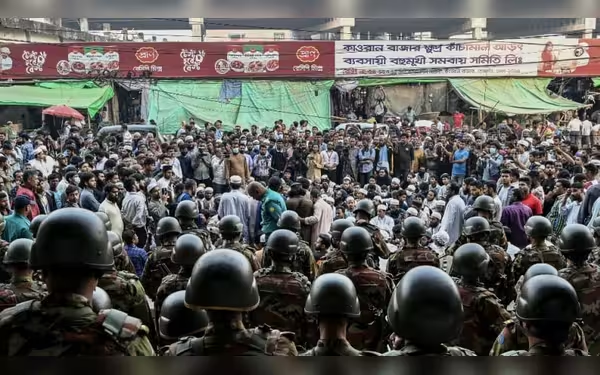Sunday, December 22, 2024 09:28 AM
Bangladesh Protests Target Prothom Alo Newspaper Closure
- Protests escalate against Prothom Alo in Dhaka.
- Accusations of bias against independent media grow.
- Journalists face investigations amid political turmoil.
 Image Credits: channelnewsasia
Image Credits: channelnewsasiaProtests in Bangladesh intensify as demonstrators demand the closure of Prothom Alo, citing bias amid political upheaval.
In recent days, Bangladesh has witnessed a surge in protests, particularly targeting independent media outlets. The protests have escalated to a point where demonstrators surrounded the offices of Prothom Alo, one of the few remaining independent newspapers in the country. This incident occurred on November 25, as around 300 protesters gathered outside the newspaper's office in Dhaka, demanding its closure. The situation became tense as government security forces were deployed to protect the building, having previously used tear gas to disperse crowds attempting to storm the premises.
The backdrop to these protests is the recent political upheaval in Bangladesh, marked by the ousting of former Prime Minister Sheikh Hasina. Following her departure to India amid a student-led revolution on August 5, the political landscape has shifted dramatically. Many protesters now accuse Prothom Alo of supporting Hasina during her time in power, a claim that the newspaper's executive editor, Sajjad Sharif, has vehemently denied. He stated, "We have consistently upheld the highest professional standards in our work and will continue to do so," emphasizing the newspaper's long history of resisting harassment.
The protests are not limited to Dhaka; they have spread to other cities, including Rajshahi and Chittagong, where demonstrators have also targeted Prothom Alo's offices. Protesters have voiced their grievances, alleging that the newspaper exhibits an "anti-Islam" and "pro-India" bias. This sentiment reflects a broader trend in Bangladesh, where Islamist groups have become more vocal and active following years of suppression.
Among the protesters, voices like that of 20-year-old Alif Bin Labib Shuvo, who was injured during earlier anti-Hasina protests, echo a common sentiment. He claimed that both Prothom Alo and another English-language newspaper, the Daily Star, are attempting to "destabilise" the nation. Another protester, Mir Farhad, 35, added, "If they don't change their current strategy, they should be closed." These statements highlight the growing tension between the media and segments of the population that feel threatened by critical journalism.
In the midst of this turmoil, interim leader Muhammad Yunus has publicly stated his commitment to media freedom. However, press watchdogs have raised concerns about the safety of journalists in Bangladesh. Reports indicate that dozens of journalists, perceived to have supported Hasina, are facing police investigations, which many view as retaliation for their past work. Currently, at least four journalists are in custody, accused of inciting violence during the protests leading up to Hasina's downfall. Organizations like Reporters Without Borders have described the situation as "systematic judicial harassment," with as many as 140 journalists under investigation.
The Committee to Protect Journalists, based in the United States, has called for reforms to ensure press freedom at this critical juncture in Bangladesh's history. As the country navigates this complex political landscape, the role of independent media becomes increasingly vital. The ongoing protests against Prothom Alo serve as a reminder of the delicate balance between freedom of expression and the pressures exerted by political movements. It is essential for the future of democracy in Bangladesh that independent journalism is protected, allowing for diverse voices and opinions to be heard.













